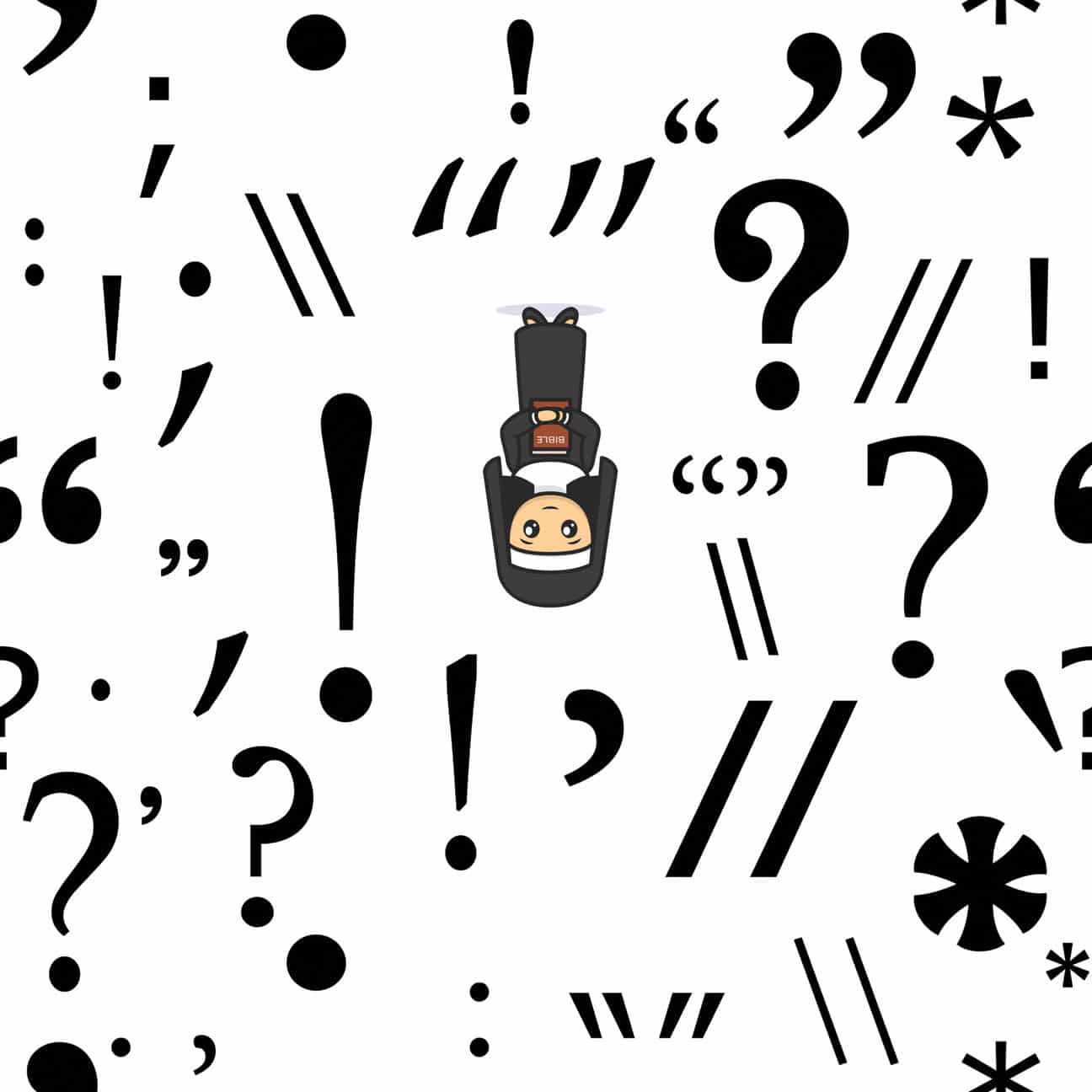 Punctuation:
ihor_seamless/Deposit Photos. Nun: Guavanaboy/Getty Images
Punctuation:
ihor_seamless/Deposit Photos. Nun: Guavanaboy/Getty Images Punctuation marks are myriad,
but my favorite is the period.
Commas tend to be divisive,
colons help the indecisive,
both abhorrent when abundant,
somewhat usually redundant.
Colons and the semicolon
mark the pause that you have stolen
from the period you needed,
till by them you were stampeded.
Exclamation marks expressive,
tend, I think, to be excessive;
questions marks like necromancers
tend to fool us with their answers.
Surrounded by parenthesis
words make far less emphasis;
in England where they’re known as “brackets,”
they hide the words in little packets.
Commas, my first subject I
will now try to demystify,
and, commenting on common commas,
call them the enemies of promise,
which, slowing down the sentence flow,
don’t stop it totally, although
the interruptions they provide
often spoil the verbal ride.
If you’re smart you may enliven
apercus with help of hyphen;
like a name that’s hyphenated,
thoughts that follow should be feted.
Quotation marks are full of lies,
and useful when you plagiarize,
from names to which you don’t allude
and surely by them may be sued,
but let me say now in conclusion:
only periods foil confusion,
better than all other marks
when you’ve concluded your remarks.
Post Scriptum
Without addition to this poem of
what I’ll discuss below, inverted nuns,
I add what parenthetically I love,
fantastically tripping with run-ons,
a punning P. S. to this verse,
referring to the Torah’s only punctuation:
the two inverted nuns that both reverse
the expectations of the Hebrew nation
heading for the Promised Land,
Jews then all doomed instead to wander
in the wilderness, for their demand
for meat more than for Israel fonder.
While taking from the Ark a scroll
we say one verse, and putting back
the scroll one more. The first one’s goal
is scoring Torah, which we lack
the moment that we have returned
the scroll, made suddenly sad Jews,
as we were when we gravely burned
for meat, and Israel’s team would lose,
like teeth with meat that‘s not been flossed.
Inverted nuns tell us despite
bad fortune, goals should not be lost,
and stand like upside nuns, upright,
while bracketing with our dependence
on God a Torah book, its seventh,
denunciating Independence,
dependent on a force that’s heaventh.
Num. 10:35-36 states in a text that is parenthesized by two inverted nuns:
לה וַיְהִי בִּנְסֹעַ הָאָרֹן, וַיֹּאמֶר מֹשֶׁה: קוּמָה יְהוָה, וְיָפֻצוּ אֹיְבֶיךָ, וְיָנֻסוּ מְשַׂנְאֶיךָ, מִפָּנֶיך 35nd it came to pass, when the ark travelled forward, that Moses said: ‘Rise up, O LORD, and let Thine enemies be scattered; and let them that hate Thee flee before Thee.’
לו וּבְנֻחֹה, יֹאמַר: שׁוּבָה יְהוָה, רִבְבוֹת אַלְפֵי יִשְׂרָאֵל. 36 And when it rested, he said: ‘Return, O LORD, unto the ten thousands of the families of Israel.’
My punning P. S. contains the phrase “gravely burned for meat,” a wordplay on the fate of the Israelites after God fulfilled their desire for meat in Kibroth-hattaavah, Graves of Desire, Num 11:33-34:
.
לג הַבָּשָׂר, עוֹדֶנּוּ בֵּין שִׁנֵּיהֶם–טֶרֶם, יִכָּרֵת; וְאַף יְהוָה, חָרָה בָעָם, וַיַּךְ יְהוָה בָּעָם, מַכָּה רַבָּה מְאֹד. 33 While the flesh was yet between their teeth, ere it was chewed, the anger of the LORD was kindled against the people, and the LORD smote the people with a very great plague.
לד וַיִּקְרָא אֶת-שֵׁם-הַמָּקוֹם הַהוּא, קִבְרוֹת הַתַּאֲוָה: כִּי-שָׁם, קָבְרוּ, אֶת-הָעָם, הַמִּתְאַוִּים. 34 And the name of that place was called Kibroth-hattaavah, because there they buried the people that desired.
Rabbi Joseph Soloveitchik explained that the reversed nuns in Numbers 10 reflect the reversal of fortune from the preceding era when all the Israelites, including Moses, thought they were about to enter the land of Israel. This era changed tragically into one in which they wandered for forty years in the wilderness. Whereas the two verses are also intriguingly analyzed by Rabbi Immanuel Bernstein in “When Letters Face Backwards: Examining the Parsha of “Vayehi Binsoa ha’Aron ” (see outorah.org/p/71085/), I suggest in my poem’s post scriptum stanza that the reason that we recite the first of these two verses before we take the Torah scroll from the Ark is because we are happily anticipating our entry into an era in which we are fully devoted to the Torah. , Whereas the reason we recite the last verse before returning the Torah scroll to the Ark is because we feel we need God’s support since we have not yet reached this idyllic era and the entire Jewish people have failed to do in most eras of our history. Explaining the parentheses enveloping these two verses, the Talmud in bShabbat 115b-116 identifies them as the seventh book of the Torah. This inspires me to think of this seventh book of the Torah as a biblical version of Israel’s “Declaration of Dependence,” in which the second part is an explicit reference to our continued dependence on God in all our efforts to defeat our foes.
Gershon Hepner is a poet who has written over 25,000 poems on subjects ranging from music to literature, politics to Torah. He grew up in England and moved to Los Angeles in 1976. Using his varied interests and experiences, he has authored dozens of papers in medical and academic journals, and authored “Legal Friction: Law, Narrative, and Identity Politics in Biblical Israel.” He can be reached at gershonhepner@gmail.com.























 More news and opinions than at a Shabbat dinner, right in your inbox.
More news and opinions than at a Shabbat dinner, right in your inbox.